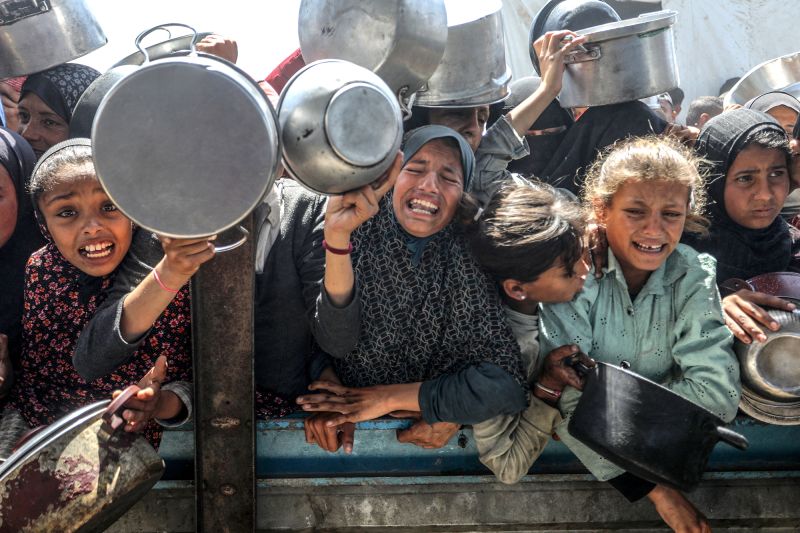
Gaza edges closer to famine as Israel’s total blockade nears its third month
Sitting inside her fly-infested tent in Gaza City, Iman Rajab sifts clumps of flour through a sieve, over and over again.
She found the half-bag of flour in a garbage dumpster. It is crawling with pests and shows clear signs of contamination. But it’s still Rajab’s best hope for keeping her six children fed and alive. So she sifts the flour once more to make bread.
“My kids are vomiting after they eat it. It smells horrible,” Rajab says of the bread it produces. “But what else can I do? What will I feed my children if not this?”
She is one of hundreds of thousands of parents in Gaza struggling to feed their children as the war-torn Palestinian enclave barrels towards full-blown and entirely man-made famine.
For nearly two months, Israel has carried out a total siege of Gaza, refusing to allow in a single truck of humanitarian aid or commercial goods – the longest period Israel has imposed such a total blockade.
Israel says it cut off the entry of humanitarian aid to pressure Hamas to release hostages. But international organizations say its actions violate international law, with some accusing Israel of using starvation as a weapon of war – a war crime.
Cases of acute child malnutrition are also rapidly rising, one of the telltale signs of impending famine. Nearly 3,700 children were diagnosed last month, an 82% increase from February, according to the United Nations.
Five-year-old Usama al-Raqab has already lost 8 lbs in the last month, now weighing just 20 lbs, according to his mother. According to the World Health Organization, the median weight for a healthy 5-year-old boy is about 40 lbs.
He has several pre-existing medical conditions – including a pancreatic disorder and respiratory issues – which require a diet rich in fats and proteins to stay healthy. Those foods have become almost completely unavailable as Israel’s siege approaches its third month.
Usama’s skin now sticks to his bones, and his mother says he can barely walk.
“I have to carry him everywhere. He can only manage to walk from the tent to the bathroom and nothing more,” she says.
When his mother takes off his clothes to bathe him, he winces in pain. Every movement is painful in his condition.
Food deliveries blocked just outside of Gaza
The aid organizations that were once the answer to a food crisis that has roiled Gaza for much of this nearly 19-month-long war are now also out of answers.
Standing in an empty warehouse, the WFP’s emergency coordinator in Gaza Yasmin Maydhane said the organization’s supplies have been “depleted.”
“We are in a position now where over 400,000 people that were receiving assistance from our hot meal kitchens – which is the last lifeline for the population – is in itself grinding to a halt,” she said.
If Israel would only open the gates to Gaza, the WFP says it is ready to surge enough aid into Gaza to feed the entire population for up to two months. UNRWA, the main UN agency supporting Palestinians, said it has nearly 3,000 trucks filled with aid waiting to cross into Gaza. Both need Israel to lift its blockade to get that aid in.
As conditions in Gaza spiral, Israel has offered no indication so far that it is planning any action to avert all-out famine.
Israel’s European allies – including France, Germany and the United Kingdom –have issued increasingly urgent calls for it to allow the entry of humanitarian aid – with one notable exception. Unlike last year, when former US President Joe Biden’s administration pressured Israel repeatedly to facilitate the entry of more aid into Gaza, President Donald Trump’s administration is backing Israel’s blockade.
The White House’s National Security Council has issued statements supportive of Israel’s control of the flow of humanitarian aid as a bargaining chip to compel Hamas to release more hostages. And last week, the newly appointed US ambassador to Israel rejected appeals from humanitarian officials to pressure Israel to open the crossings.
“What I would like to suggest is that we work together on putting the pressure where it really belongs: on Hamas,” Ambassador Mike Huckabee said, calling on Hamas to agree to another hostage release deal. “When that happens and hostages are released, which is an urgent matter for all of us, then we hope that that humanitarian aid will flow and flow freely.”
But Gaza’s starving civilians are running out of time.
At a soup kitchen in al-Nuseirat in central Gaza last Friday, hundreds of Palestinians waited in line in the scorching sun for the only meal most of them will eat that day.
Sitting on the ground, an elderly woman named Aisha shields her head from the sun with the pot she hopes will be filled with food. She feels sick – her head feels like it is melting, she says.
“We are starving, tired, and weary of this life,” Aisha says, her voice weak with fatigue. “There is no food, no nothing. Death is easier than this life.”
Young and the old crowd towards the front of the line, pots and bowls raised high. The one meal a day from this charitable association has become their only lifeline – but the exhausting routine of hours spent standing in line for meager sustenance is pushing him and many others to the brink.
“This pot – how can it feed eight people?” Abu Subhi Hararah shouts, unable to contain his frustration. “Who should I feed – my wife, my son, or the elderly?
“Our children are dying from war, from bombings at schools, tents and homes,” he cries. “Have mercy on us. We are searching for a morsel of food.”
